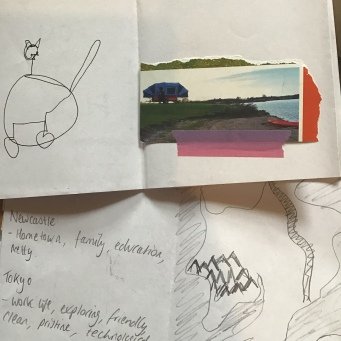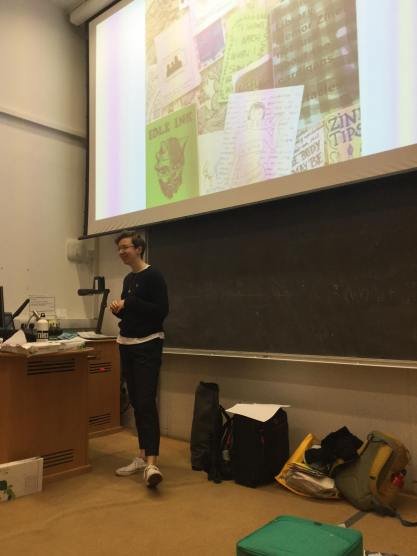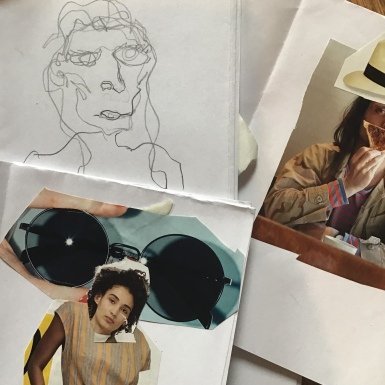Encountering Cities: A Human Geography Zine Workshop (2018)
I was approached by Dan, a senior lecturer in the Geography department, after a mutual acquaintance put us in touch (someone who had bought my vegan Edinburgh map also worked in his department). Dan was interested in getting students making zines as part of their encountering cities module. Part of the module was to complete fieldwork in Edinburgh, and he was looking for a way for them to communicate their research and reflect on their experience, as well as challenge some of their ideas and think creatively about knowledges about cities specifically.
Is a zine made for a university assessment technically a zine? I went back and forth on this – bringing zine making into an institutional context risks neutering zine-making’s power, and appropriating DIY culture. What were the ethical implications of bringing zines and zine making into the context of an institution like the University of Edinburgh? In the end I decided three things. You are welcome to disagree with them.
Many of these students would be encountering zines for the first time. If this encounter was with the zine library (and the wider world/context of zines) they’d have a better time than if it was just an assessment zine. Whatever way you come into contact with zines, there’s always a potential that you will then go on to make more outside of this original context. I had no intention of pulling any punches in introducing the students to zine cultures.
Making these zines and then taking them out of the institutional context remains a radical act. I hoped that some students would appreciate and take away from this.
It was well paid. No point pretending that this wasn’t a factor, although its possible I would have done it anyway. The zine library is unfunded, so any income I or we get from it allows us to subsidise other workshops. It would be the ideal if the zine library could operate on the same economy that zines often operate, but for me the biggest learning curve in actually co-running the zine library has been about accepting the gap between the ideal and the reality, and attempting to bridge and navigate it.
Structure:
Working on the assumption that none of the students had encountered zines before I started with a short 20-minute discussion of zines, the zine library and zine culture. The room was a lecture theatre with tiered seats (something I’d been worried about. Firstly because everyone is looking *at* you and secondly because we normally have groups sitting working at tables.)
Set up: Powerpoint was set up already, zines from the collection were laid out at the front of the room, pens, scissors, glue and magazines were handed out at the end of each row, with the instruction to pass down the row to distribute them as evenly as possible. We could have done with more scissors. The rest of the materials were hurled with gay abandon at the front of the room.
Reflections:
The zine library isn’t staffed, so it’s an unusual joy to see folk interacting with zines that you know and love from the collection. It was my favorite part of the workshop to be able to thrust zines at participants – ‘this is by the same maker’, ‘if you like that, you’ll love this’, ‘this is another great example of…’. I really enjoyed seeing people pick up a zine that spoke to them, or show something to a friend. It would be great to pursue other opportunities to do this (taking the whole library to events), as I enjoy it so much.
There were some students who weren’t, and were never going to be, interested in the workshop. It wasn’t for them, and I wasn’t going to spend energy worrying about them. There were some students who were really engaged and I felt like the majority of the room was at least interested, and I was glad to be able to run an activity for them. It’s always so much more enjoyable when folks enter into the spirit of things. There was a moment in wreck this zine where the room switched from frantic collaging and chatting quiet reflection and writing, and that was a nice moment because I felt like everyone was actively participating.
The workshop brought up some interesting questions. What does it mean to hold a workshop in an institutional setting like the University of Edinburgh? What does it mean to hold a workshop specifically in the University of Edinburgh? We have in the past, for example, stepped back from an event held in a space that hosted A Woman’s Place in the weeks previous because we didn’t feel like they would feel welcoming or safe to some of our members and our community. Safe/r spaces is not straight forward, and we are fairly new and inexperienced in negotiating it. What does it mean to have a safer-spaces policy when you are navigating external spaces over which you do not have ownership? EZL is hosted by the Central Library in Edinburgh, we don’t have our own space and so make an active choice as to what spaces we use. Aside from this, can it be considered ‘zine-making’ when it is done with the aim of an assessment? And what are the implications of being paid for a workshop?
I was very anxious before this workshop, because of the size of the group and the space it was in, and the fact I was being paid for it made me feel like I had to be ‘value for money’. As a result, the morning of, Abi and I had a steaming row about what it would mean to really pursue funding for the zine library, and paying members for the work they put in (FYI in the argument I was against, Abi was for, but as is the nature of such arguments in reality we are both just a murky, greyscale middle). Afterwards we went for breakfast with a mutual friend, which was a v.good idea and a welcome break from the nerves. But I was still rocking that great all-over body anxiety/heavy dread in the pit of my stomach/incredibly sensory and irritable feeling for most of the day. Once I got started it eased off, although as I was talking there was a moment where I was thrown back into my body and was like ‘woah bad idea, detach, detach!’ My point here is that I probably looked like a totally functional human being for most, if not all, of this workshop but I remained the same disabled, neurodivergent person throughout, and had to spend several days recovering afterward. I was paid for three hours, but it cost me about three days (still worked out as paying more than my zero-hours, fraction above min-wage coffee shop job though.
If you’d like me to come wax lyrical about zines, or run a workshop at your organisation or group, get in touch at lilithjoycecooper@gmail.com



